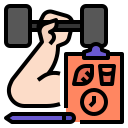Top Home Exercises for Beginners
Chosen theme: Top Home Exercises for Beginners. Start strong, stay safe, and feel proud from day one with simple, effective moves you can do right in your living room. Subscribe and share your first-week goals—let’s cheer each other on.

Beginner-Friendly Setup and Mindset
Clear a two-step radius around your mat or rug, remove tripping hazards, and keep water nearby. Good light helps posture, while a timer and upbeat music make beginner home exercises feel fun, focused, and consistently rewarding.


Beginner-Friendly Setup and Mindset
Start with three sessions per week, fifteen to twenty minutes each, using a simple checklist. Measure progress by reps, effort, and how you feel afterward. Celebrate improvements like easier stairs or steadier balance during everyday tasks.

Joint Prep in Five Minutes
Circle wrists and ankles, roll shoulders, and slowly rotate hips. Add gentle heel-to-toe rocks and neck nods. Keep movements smooth, never forced. This routine wakes sleepy joints so beginner exercises feel controlled, steady, and pleasantly energizing.
Breathing That Powers Movement
Inhale through your nose as you lengthen, exhale through your mouth as you effort. This rhythm stabilizes your core and calms nerves, helping beginners feel secure during squats, planks, and low-impact cardio at home.
Engagement Prompt: Your Warm-Up Playlist
What song gets you moving in thirty seconds or less? Comment your warm-up playlist and follow for new beginner-friendly tracks. Together we’ll build a fun soundtrack that makes consistent home exercise feel easier and more exciting.
Core Basics: Planks, Bridges, and Balance
Start on your knees and forearms, elbows under shoulders. Gently brace your belly as if zipping tight jeans, and keep a long neck. Ten to twenty seconds per set builds confidence without strain for complete beginners.
Core Basics: Planks, Bridges, and Balance
Lie on your back, feet hip-width, exhale and drive through heels to lift hips. Pause, squeeze glutes, lower slowly. Bridges reduce back tightness and teach alignment that supports squats, lunges, and daily bending with better control.

Lower Body Starters: Squats and Lunges Made Easy
Stand tall in front of a chair, feet hip-width. Reach hips back, lightly tap the seat, then stand. Keep knees tracking over toes. As confidence grows, squat to a lower surface for gentle, progressive challenge at home.

Upper Body Essentials Without Equipment
Wall Push-Ups to Counter Push-Ups
Begin facing a wall, hands chest-height, and keep your body in a straight line. When ten to twelve reps feel easy, graduate to countertop push-ups. This gradual incline shift strengthens chest and arms while protecting sensitive wrists.
Knee-Elevated Box Plank Taps
Place hands on a sturdy box or couch edge, knees on the floor. Tap one shoulder, then the other, resisting sway. This beginner variation challenges shoulders and core together, building stability for future floor-based push-up progressions.
Scapular Wall Slides
Stand with back to the wall, elbows bent, backs of hands touching. Slowly slide arms up while keeping ribs down. These teach shoulder control, opening posture so pressing and daily reaching feel smoother for true beginners.
Two-Minute Stretch Flow
Breathe slowly through cat-cow, then a gentle hamstring stretch using a towel, finishing with chest-opening doorway stretches. Keep pressure light and rhythmic. This mini-sequence signals your body that training is done and recovery begins.
Sleep and Hydration Matter
Aim for seven to nine hours of sleep to consolidate learning and muscle repair. Sip water regularly, especially after sweating. These simple habits amplify gains from beginner home exercises without adding any extra workout time.
Join the Beginner Community
Share your first three workouts in the comments, ask questions, and subscribe for weekly beginner plans. Your story could be the nudge another newcomer needs to start their top home exercises for beginners today.
